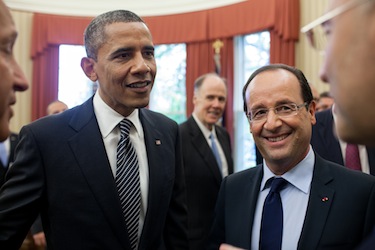NSA Surveillance Threatens Franco-American Relations
This week the French government publicly condemned the National Security Agency for allegedly conducting a widespread collection of digital communications within France, creating tension between the United States government and one of its most crucial allies.

The French newspaper La Monde published an article on Monday alleging that the NSA had collected 70 million digital communications within France during a 30-day period of time.
"This type of practice between partners is an assault on privacy, and is totally unacceptable," French Foreign Minister Laurent Fabius told the Wall Street Journal.
United States officials disputed the allegations. James R. Clapper, the United States director of national intelligence, labeled the claims “misleading.”
"The allegation that the National Security Agency collected more than 70 million 'recordings of French citizens' telephone data' is false," Clapper said in a statement released on Tuesday.
While public tensions are high, the incident may not pose a serious threat to long-term relations between the United States and France. Despite public outcry, French officials refrained from labeling the incident a violation of sovereignty.
The circumstances of the allegations also do not involve the French head of state, President François Hollande. Although the NSA has been accused of spying on the heads of state of Brazil and Mexico, La Monde did not allege that the NSA spied on Hollande.
According to Professor Jonathan Aronson, an expert in international relations at the University of Southern California, that may limit the damage to the relationship between the United States and France.
"In Brazil and Mexico, the accusation is that we've been spying on the Internet of the leader, that we've been spying on the head of state," Aronson pointed out. "Here, the accusation is that they downloaded a whole bunch of telephone calls from regular French citizens, so we may have spied on Hollande, who is the head of state, but that hasn't, at least as far as I know, come out."
In contrast to Brazil and Mexico, France shares worries about extremist Islamic terrorism with the United States. Like the United States, France has been targeted by al Qaeda. France also faces security concerns regarding its large population of North African immigrants.
According to international law expert Edwin M. Smith, a professor of law and international relations at USC, France may see cooperation with the United States and even some aspects of the NSA's surveillance as beneficial to its national security.
"The French may see the situation a bit different [than the Brazilians],” Smith noted. “They may want to maintain the relationship with the US in terms of intelligence collection. They may actually be benefiting from the intelligence."
France is likely to prioritize the national security benefits that the United States provides over the NSA's invasions of the privacy of French citizens. As a result, France may not consider the NSA's actions as a serious enough transgression to disrupt its relationship with the United States.
“In each situation, each country will consider the level of its relationship with the United States and the degree to which it shares similar concerns with regard to intelligence question,” Smith explained. “To the extent that France values maintaining a relationship with the US and the NSA in particular, then it may be that France will definitely state its dissatisfaction with the covert spying on its citizens but it doesn’t mean France will consider it to be a major violation of relationships.”
Reach Staff Reporter Sarah Allen here.



